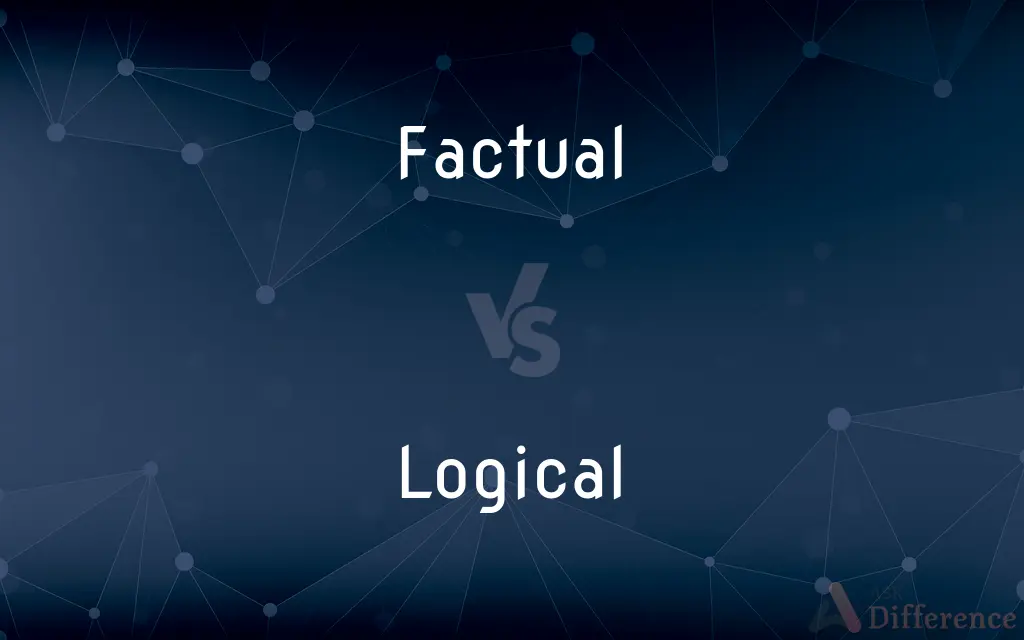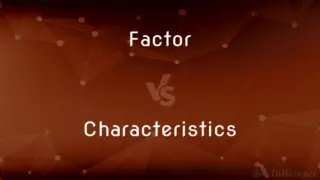Factual vs. Logical — What's the Difference?
By Fiza Rafique & Maham Liaqat — Updated on March 21, 2024
Factual information is based on actual events or data, while logical statements are derived from reasoning, irrespective of real-world occurrences.

Difference Between Factual and Logical
Table of Contents
ADVERTISEMENT
Key Differences
Factual information relies on evidence and observable realities, often verifiable through data, documentation, or direct observation. Facts are concrete details or statistics that provide knowledge about the world, such as historical events, scientific data, or personal records. On the other hand, logical statements depend on reasoning and the application of logical principles. They follow from premises to conclusions based on deductive or inductive reasoning, without necessarily being tied to physical evidence or observed phenomena.
While factual information is about what is or has been true in the real world, logical statements are concerned with the relationship between ideas and whether conclusions logically follow from given premises. For example, a factual statement might detail the population of a city at a certain time, whereas a logical statement could involve concluding that if all residents are required to vote and John is a resident, then John is required to vote.
The validity of factual statements can usually be tested through empirical evidence and observation. In contrast, the validity of logical statements is determined by the structure of the argument and whether the conclusion necessarily follows from the premises, irrespective of the factual accuracy of those premises.
Facts can be subject to change as new evidence or data emerges, but the principles of logic are constant, focusing on the form of reasoning rather than the content. For instance, scientific facts may evolve with new discoveries, but the logical process used to derive conclusions from observations remains based on established principles of reasoning.
Logical reasoning is essential for building arguments, testing hypotheses, and critical thinking. It allows us to infer conclusions from given information, while factual knowledge provides the foundational data and evidence upon which reasoning often depends. Both factual and logical understanding are crucial for a comprehensive approach to learning, decision-making, and analysis.
ADVERTISEMENT
Comparison Chart
Basis
Evidence and observable realities.
Reasoning and the structure of arguments.
Verification
Through data, documentation, or observation.
Through the application of logical principles.
Focus
Actual events, data, or experiences.
Relationship between ideas and validity of conclusions.
Changeability
Subject to change with new evidence.
Constant, based on principles of reasoning.
Application
Provides knowledge about the world.
Used in reasoning, argumentation, and analysis.
Compare with Definitions
Factual
Reliant on concrete information.
The documentary was praised for its factual accuracy.
Logical
Involving the relationship between ideas.
The logical structure of the theory was compelling.
Factual
Pertaining to real occurrences.
Factual discrepancies in the report raised questions.
Logical
Pertaining to sound reasoning.
The detective's logical deduction led to the suspect.
Factual
Verifiable through evidence.
His factual statement was supported by the experiment's results.
Logical
Reflecting deductive reasoning.
Her conclusion was logical, derived from the premises provided.
Factual
Reflecting observable realities.
Her research is grounded in factual data from field observations.
Logical
Based on the principles of logic.
His argument was logical, though not based on facts.
Factual
Based on actual data.
The factual account of the battle was confirmed by historical records.
Logical
Following from reasoning, not observation.
The logical fallacy undermined his otherwise strong argument.
Factual
Concerned with what is actually the case
A mixture of comment and factual information
Logical
Of, relating to, in accordance with, or of the nature of logic
Logical disputation.
Factual
Of the nature of fact; real.
Logical
Based on earlier or otherwise known statements, events, or conditions; reasonable
Rain was a logical expectation, given the time of year.
Factual
Of or containing facts.
Logical
Reasoning or capable of reasoning in a clear and consistent manner
A very logical person.
Factual
Pertaining to or consisting of objective claims.
Logical
(not comparable) In agreement with the principles of logic.
Factual
True, accurate, corresponding to reality.
Logical
Reasonable.
Factual
Of or pertaining to facts; as, factual inaccuracies.
Logical
(not comparable) Of or pertaining to logic.
It's not logical, it's God!
Factual
Containing only facts (as contrasted with opinions or speculations); as, a factual report.
Logical
(computing) Relating to the conceptual model of a system rather than its physical expression
Logical memory appears contiguous to an application program, but may well be stored on several physical devices, including in RAM and on hard-disks, as determined by the operating system.
Factual
Of the nature of fact; having actual existence;
Rocks and trees...the actual world
Actual heroism
The actual things that produced the emotion you experienced
Logical
Of or pertaining to logic; used in logic; as, logical subtilties.
Factual
Of or relating to or characterized by facts;
Factual considerations
Logical
According to the rules of logic; as, a logical argument or inference; the reasoning is logical; a logical argument; a logical impossibility.
Factual
Existing in fact whether with lawful authority or not;
De facto segregation is as real as segration imposed by law
A de facto state of war
Logical
Skilled in logic; versed in the art of thinking and reasoning; as, he is a logical thinker.
Factual
Based on fact;
Factual accuracy
A factual account
Logical
Capable of or reflecting the capability for correct and valid reasoning;
A logical mind
Factual
Characterized by fact;
The factual aspects of the case
Logical
In accordance with reason or logic;
A logical conclusion
Logical
Marked by an orderly, logical, and aesthetically consistent relation of parts;
A logical argument
The orderly presentation
Logical
Based on known statements or events or conditions;
Rain was a logical expectation, given the time of year
Logical
Capable of thinking and expressing yourself in a clear and consistent manner;
A lucid thinker
She was more coherent than she had been just after the accident
Common Curiosities
What makes a statement factual?
A statement is factual if it is based on real events, data, or observable phenomena and can be verified through evidence.
Why is factual accuracy important?
Factual accuracy is crucial for ensuring that decisions, conclusions, and beliefs are based on the most reliable and current information available.
How do facts and logic work together?
Facts provide the evidence or data upon which logical reasoning can be applied, allowing for informed conclusions and decisions.
How is logical reasoning different from factual knowledge?
Logical reasoning is based on the structure and validity of arguments derived from principles of reasoning, while factual knowledge is based on concrete, verifiable information about the real world.
Can a fact change over time?
Yes, what is considered a fact can change as new evidence or data emerges, leading to revised understandings or conclusions.
Is logical reasoning subjective?
The process of logical reasoning is objective, based on established principles, but the premises chosen can introduce subjectivity.
How do we determine the validity of a logical argument?
The validity of a logical argument is determined by whether its conclusion logically follows from its premises, irrespective of the factual accuracy of those premises.
Can a logical statement be false?
A logical statement can be valid in terms of its structure but based on false premises, making its conclusion untrue in the real world.
Are all factual statements true?
While factual statements aim to reflect truth based on evidence, they can be disproven or revised with new information or understanding.
Can logical principles be applied universally?
Yes, logical principles are universal and can be applied across different contexts, arguments, and disciplines.
Share Your Discovery

Previous Comparison
Factor vs. Characteristics
Next Comparison
Northerly vs. NorthernlyAuthor Spotlight
Written by
Fiza RafiqueFiza Rafique is a skilled content writer at AskDifference.com, where she meticulously refines and enhances written pieces. Drawing from her vast editorial expertise, Fiza ensures clarity, accuracy, and precision in every article. Passionate about language, she continually seeks to elevate the quality of content for readers worldwide.
Co-written by
Maham Liaqat













































